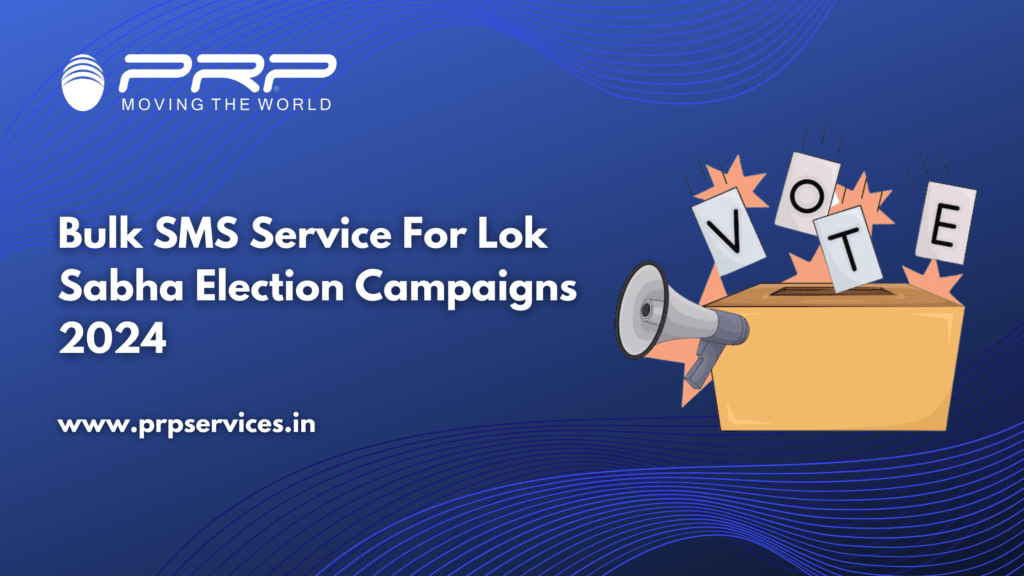Bulk SMS service is a communication tool that allows businesses, organizations, and individuals to send large volumes of text messages together to multiple recipients. It enables the distribution of messages to a wide audience, ranging from a few hundred to thousands or even millions of recipients, depending on the requirements of the sender.

Bulk SMS for Lok Sabha Election Campaigns
Bulk SMS services play a medium role in Lok Sabha election campaigns by enabling political parties and candidates to connect with voters on a large scale, expand information, mobilize support, and drive voter engagement.

Benefits of Bulk SMS in Election Campaigns
- Real-Time Updates: Keep voters informed about campaign events, rallies, candidate speeches, and policy announcements in real-time.
- Mobilization Efforts: Encourage voter participation and engagement by sending targeted SMS messages that inspire action.
- Get-Out-The-Vote (GOTV) Initiatives: Use bulk SMS to remind registered voters about election dates, polling locations, voting procedures, and important deadlines.
- Issue Awareness: Raise awareness about key campaign issues, party platforms, and candidate policies through SMS messaging.
- Feedback and Surveys: Ask feedback from voters through SMS surveys, polls, or feedback forms to measure public opinion, define voter sentiment, and understand agents priorities.
Key Features of Bulk SMS Service in Lok Sabha Election Campaigns
- Mass Messaging: Bulk SMS services enable political parties and candidates to send messages to large volumes of recipients simultaneously, allowing them to reach a broad audience quickly and efficiently.
- Personalization: Campaign messages can be personalized with recipients’ names, constituency details, or other relevant information to increase engagement and relevance.
- Scheduling: Bulk SMS platforms allow users to schedule messages for delivery at specific dates and times.
- Targeted Messaging: Campaign messages can be targeted based on voter demographics, geographical location, or other criteria.
- Two-Way Communication: Some bulk SMS services support two-way communication, allowing recipients to respond to messages.

Implementation of Bulk SMS Service for 2024 Lok Sabha Elections
Implementing a bulk SMS service for the 2024 Lok Sabha Elections requires careful planning, execution, and compliance to regulatory guidelines. Here’s a step-by-step guide to effectively implementing bulk SMS service for political campaigning:
- Identify Campaign Goals and Target Audience: Define the objectives of your campaign and identify the target audience based on demographics, geographical location, and voter preferences. Determine the key messages you want to convey to voters and shape your SMS communications accordingly.
- Choose a Reliable Bulk SMS Service Provider: Research and select a reputable bulk SMS service provider that offers features such as mass messaging, personalization, scheduling, analytics, and compliance mechanisms. Ensure that the provider adheres to regulatory standards and provides reliable delivery services.
- Build a Quality Contact Database: Compile a comprehensive database of mobile phone numbers of registered voters and supporters. Ensure that the contact information is accurate, up-to-date, and obtained through legitimate means. Segment the database based on criteria such as demographics, location, and engagement level for targeted messaging.
- Craft Compelling SMS Messages: Create engaging and impactful SMS messages that resonate with your target audience. Keep the messages concise, clear, and relevant to the campaign objectives. Personalize the messages with recipient names or other personalized elements to enhance engagement.
- Plan Messaging Schedule: Develop a messaging schedule that aligns with the campaign timeline and key events such as rallies, speeches, debates, and polling dates. Schedule messages strategically to boost reach and impact, taking into account the timing preferences of the target audience.
- Ensure Regulatory Compliance: bond to regulatory guidelines and ethical standards governing political messaging, including obtaining consent from recipients, providing opt-out options, and complying with data protection laws. Ensure transparency and accountability in all SMS communications to maintain trust and credibility.
- Monitor and Analyze Performance: Monitor the performance of your bulk SMS campaigns in real-time using analytics provided by the SMS service provider. Track metrics such as delivery rates, open rates, click-through rates, and response rates to gauge the effectiveness of your messaging strategies. Use this data to refine and optimize future campaigns for better results.
- Engage in Two-Way Communication: Encourage recipients to engage with your campaign by enabling two-way communication through SMS. Allow recipients respond to messages with questions, feedback, or requests for more information. Engage in meaningful dialogue with voters to build connection and address their concerns effectively.
- Integrate with Other Campaign Channels: Integrate bulk SMS messaging with other campaign channels such as social media, email, and traditional media for a matched and comprehensive outreach strategy. Coordinate messaging across channels to reinforce campaign themes and raise your message to a wider audience.
- Evaluate and Iterate: After the election campaign, evaluate the overall performance of your bulk SMS initiatives and identify areas for improvement. Gather feedback from recipients and campaign stakeholders to gain insights into what worked well and what can be enhanced in future campaigns. Iterate on your strategies based on lessons learned to continuously improve campaign effectiveness.

